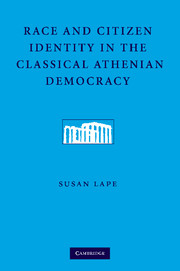Book contents
- Frontmatter
- Contents
- Preface
- Acknowledgments
- RACE AND CITIZEN IDENTITY IN THE CLASSICAL ATHENIAN DEMOCRACY
- 1 Theorizing Citizen Identity
- 2 The Rhetoric of Racial Citizenship
- 3 Euripides' “Ion” and the Family Romance of Athenian Racialism
- 4 Athenian Identity in History and as History
- 5 Trials of Citizen Identity: Policing and Producing the Racial Frontier
- 6 Myths and Realities of Racial Citizenship
- Abbreviations
- References
- Index of Names and Subjects
- Index of Passages Discussed
3 - Euripides' “Ion” and the Family Romance of Athenian Racialism
Published online by Cambridge University Press: 05 May 2010
- Frontmatter
- Contents
- Preface
- Acknowledgments
- RACE AND CITIZEN IDENTITY IN THE CLASSICAL ATHENIAN DEMOCRACY
- 1 Theorizing Citizen Identity
- 2 The Rhetoric of Racial Citizenship
- 3 Euripides' “Ion” and the Family Romance of Athenian Racialism
- 4 Athenian Identity in History and as History
- 5 Trials of Citizen Identity: Policing and Producing the Racial Frontier
- 6 Myths and Realities of Racial Citizenship
- Abbreviations
- References
- Index of Names and Subjects
- Index of Passages Discussed
Summary
THE FAMILY PLOT: ATHENIAN RACIALISM ON STAGE
Euripides' Ion, produced sometime between 420 and 409, recapitulates Athenian racial ideology as a family romance. Characters in the play both embody and act out the belief that citizens were thought to inherit the patriotism and special characteristics that qualified them for citizenship. For this reason, the Ion provides a rare glimpse of the play of ideologies (gender, kinship, etc.) that orchestrate racial citizenship as a cultural practice and political ideology. This is, of course, neither to say that the Ion offers us an accurate portrait of exactly how these negotiations worked in practice nor to imply that Euripides intended to endorse the dysfunctional family dynamics he portrays. Rather, the Ion stages what would have been necessary in order for the Athenians to be who they claimed themselves to be.
In broad outline, the story is as follows. Creousa, the sole surviving carrier of Athens' autochthonous bloodline, has traveled to Delphi to consult the oracle about the long sterility of her marriage and about the fate of her abandoned child. Years before, when she was an unwed parthenos, Apollo had raped and impregnated her in a cave. She bore the resulting child, but exposed it in fear because of her unmarried state. Circumstances in Delphi lead her to conclude that Apollo has allowed the child to die. At this juncture, her husband, Xouthos, makes his belated arrival and successfully consults Apollo's oracle.
- Type
- Chapter
- Information
- Publisher: Cambridge University PressPrint publication year: 2010



